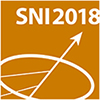Speaker
Description
Molecular brushes are densely grafted polymers composed of a polymeric backbone and side arms. Their complex architecture can easily be adjusted by changing the side arm architecture. A series of amphiphilic molecular brushes with diblock or random copolymer side arms is investigated, where the side arms contain both poly(propylene oxide) (PPO) and poly(ethylene oxide) (PEO) segments, both having lower critical solution behavior in aqueous solution, leading to a conformational transformation of the side arms, and thus the molecular brushes.
In the present work, the temperature-dependent conformation of the molecular brushes with PPO-r-PEO and PPO-b-PEO side arms in dilute aqueous solution is investigated by small-angle neutron scattering along with dynamic light scattering. As temperature is increased, the random brush shows a strong increase in size at a temperature of 41 °C, where they aggregate; for the block copolymer brush, the size increases gradually before the aggregation sets in at 68 °C. This model system provides insight into the effects caused by the thermoresponsive behavior of the PPO and PEO segments under the different steric constraints.

